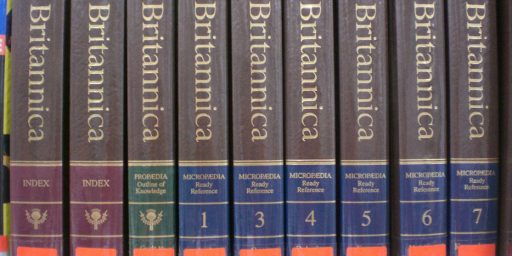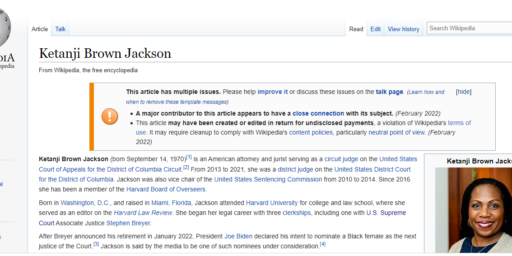Wikipedia: Information Anarchy
Crispin Sartwell has an interesting commentary in today’s Los Angeles Times on the Wikipedia phenomenon.
Wikipedia: See ‘Information,’ ‘Amazing,’ ‘Anarchy’
This is anarchy, of course, and completely antithetical to the encyclopedic tradition, which has emphasized a kind of solemn definitiveness and authority. Britannica and Encarta, for instance, not only employ experts to write their articles but subject everything they publish to a rigorous review process. At Wikipedia, you (or any old maniac) can march right onto the “nuclear fusion” page and add your thoughts.
But as Wikipedia says about itself, the point is not that it’s hard to make mistakes but that it’s easy to correct them. Because thousands of people — ordinary, unpaid, outside participants — monitor and edit Wikipedia, errors and vandalism are often corrected in seconds. One feature of the site is a list of recently updated pages, so that one can keep track of changes. One can even revert to a previous version of an article if mistaken or malevolent parties have messed it up.
The result is not perfect. In one brief instance, a character from “Star Wars” was labeled Benedict XVI. But such is the exception, not the rule, and usually quickly rectified. Overall, the encyclopedia gets ever larger and ever more accurate. The English version has grown to more than half a million entries, and in checking the “recent changes” section I once found a dozen or more revisions every minute. The site also provides contexts in which changes can be proposed and discussed among writers.
So is it to be trusted? Does it have the credibility of Britannica? Well, I have monitored over a decent period a number of entries on matters about which I know something and have found them almost invariably accurate. And I have watched some of them grow, becoming ever more elaborate and interlinked.
In fact, open architecture is in some sense the only possible way to do what an encyclopedia purports to do: represent the state of human knowledge in real time. Such a project is by its nature so huge that it requires what Wikipedia has: thousands of experts, editors, checkers and so on with expertise in different fields working over a period of years. Also, Wikipedia, unlike the World Book, for example, or even Encarta, is updated continuously. When we use the term “public property,” we usually mean state property, but Wikipedia compromises the concept of ownership without dispossessing anyone: It is truly public property.
I must admit that I had my doubts about the project. It seems to be working rather well, though. I use it rather regularly for fact checking stories.
Traditional encyclopedias are expensive, quickly dated, and lack information on items not deemed worthy of inclusion (or even extant) at the time of production. For example, I paid something on the order of $2000 for my set of Encyclopaedia Britannica, circa 1990. I’ve carted it around on my through several moves but it’s currently collecting dust in boxes out in the garage, having been deemed unworthy of my limited shelf space. Thankfully, the Great Books and Annals of America volumes that came with the set are still worth having at the ready.
Ace disagrees vehemently, however.





The “Palpatine” photo was pretty great, btw.
It doesn’t really seem like it’s information “anarchy,” as there’s still an organizing structure (the software) and a community understanding of how things operate.
I think it’s pretty much a waste of time. Sure, it’s “self-correcting”, but how do you know you’ve got the “correct” version in front of you at any given time? The last guy with his version of “correct” has the last say, until the next guy injects his own.
Maybe for general information, along the lines of a thesaurus, it works. But with no way to achieve a definition about what’s “right or wrong” factually, it faces severe challenges to information integrity.
With half of university graduates now informed that “there’s no right or wrong version” of history of fact–only privileged ones–I’m not at all convinced that reality should be determined by concensus.
John: I figure that for “new” entries, it’s a rough draft. For established ones, though, it’s pretty solid. As with blogs, there are a lot of people out there with good info willing to put in the work to share it. Probably not that many people without some genuine expertise would bother trying to edit an encyclopedia. Why would they?
You bought Brittanica in 1990? LAst version of that I trusted was the 1911 revision.